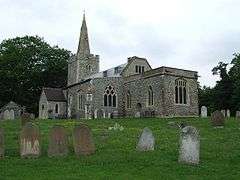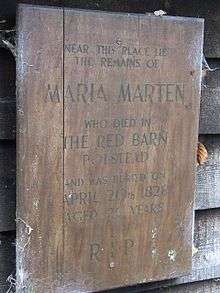Polstead
| Polstead | |
 Church of St Mary, Polstead |
|
 Polstead |
|
| Population | 851 (2011)[1] |
|---|---|
| OS grid reference | TL991374 |
| Civil parish | Polstead |
| District | Babergh |
| Shire county | Suffolk |
| Region | East |
| Country | England |
| Sovereign state | United Kingdom |
| Post town | COLCHESTER |
| Postcode district | CO6 |
| Dialling code | 01206 |
| Police | Suffolk |
| Fire | Suffolk |
| Ambulance | East of England |
| EU Parliament | East of England |
| UK Parliament | South Suffolk |
Coordinates: 52°00′25″N 0°54′07″E / 52.007°N 0.902°E

Polstead is a small village and civil parish in the Babergh district of Suffolk, England. The village lies 3 miles (4.8 km) northeast of Nayland, 5 miles (8 km) southwest of Hadleigh and 9 miles (14 km) north of Colchester. It is situated on a small tributary stream of the River Stour.
History
The name Polstead is derived from "Place by a pool"[2] There are still two large ponds in the village.
The village is noted for being the site of the Red Barn Murder in 1827. The victim Maria Marten, once found, was re-buried in the churchyard of St Mary's Church, but her gravestone was eventually chipped away to nothing by souvenir hunters. Only a sign on the shed wall now marks the approximate place where it stood,[3] although her name is given to Marten's Lane which adjoins Water Lane and Mill Street.
The church, situated at the bottom of Polstead Hill, close to Polstead Pond, dates from the 12th century and contains some of what may be the earliest bricks made in England. The tower, which is 14th century, is the only one in Suffolk which still has its original spire. The tower at one time contained six bells. The interior of the church contains two brasses, one of which is of a priest and bears a date of 1460.[4][5]
Next to the churchyard is Polstead Hall, rebuilt in the Georgian style in about 1819. In the grounds of the hall are the remains of the "Gospel Oak", which collapsed in 1953, but which was said to have been more than 1,000 years old. A small oak tree now grows next to the place it once stood.[3]
Features
The main village is situated around Polstead Green and the Hill, although Polstead also comprises several hamlets including Polstead Heath, Hadleigh Heath, Bower House Tye, Bell's Corner, Mill Street and White Street Green.
The village has one remaining pub, the 17th century Cock Inn, a community shop and post office and a playing field. The playing field, known locally as the pitch, hosts an annual music festival around the summer solstice called "Polstice", with local punk, folk and rock bands playing. In the 19th century a fair, lasting for two days, was held on Polstead Green on the Wednesday following 16 July.[4]
Polstead is famous for its cherries and lends its name to a variety, the Polstead Black.[3] In recent years more Polstead Black cherry trees have been planted in and around the village, as these trees had declined in numbers.[6]

Bower House Tye
Bower House Tye is a hamlet near the A1071 road within the parish.[7]There are five monumental buildings: Bower House,[8] Brewery Farmhouse,[9] Holly Cottage,[10] Holmwood Cottages 1 and 2[11] en The Bower Close.[12]
Notable resident
- The cricketer and academic R. P. Keigwin lived in the village and died there in 1972.
See also
- Polstead Road, Oxford, England
References
- ↑ "Civil Parish population 2011". Retrieved 12 September 2015.
- ↑ Eilert Ekwall, The Concise Oxford Dictionary of English Place-names, OUP, Fourth Edition (1960)
- 1 2 3 "Polstead" at beautifulengland.net
- 1 2 Polstead at genuki
- ↑ Nikolaus Pevsner (1961), Buildings_of_England: Suffolk, Penguin, Polstead. Pevsner says the spire is later than its tower.
- ↑
- ↑ "Ordnance Survey Leisure getamap, ideal for route planning including walking routes, running routes and cycling routes". ordnancesurvey.co.uk.
- ↑ "Bower House - Polstead - Suffolk - England - British Listed Buildings". britishlistedbuildings.co.uk.
- ↑ "Brewery Farmhouse - Polstead - Suffolk - England - British Listed Buildings". britishlistedbuildings.co.uk.
- ↑ "Holly Cottage - Polstead - Suffolk - England - British Listed Buildings". britishlistedbuildings.co.uk.
- ↑ "Holmwood Cottages - Polstead - Suffolk - England - British Listed Buildings". britishlistedbuildings.co.uk.
- ↑ "The Bower Close - Polstead - Suffolk - England - British Listed Buildings". britishlistedbuildings.co.uk.
External links
![]() Media related to Polstead at Wikimedia Commons
Media related to Polstead at Wikimedia Commons